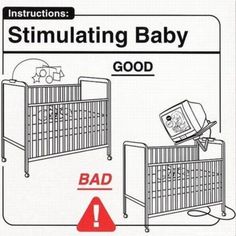The other week my wife and I took our 7 month old baby aka ‘Laughing Boy’ off to the doctors for a basic check up to see how he was doing. What the doctor told me shocked me to the core. It’s not that the doctor noticed anything wrong with Laughing Boy, but that he noticed something in him that he had seen in all too few of the other babies that he saw.
The Doctor said to us: ‘I can easily see that you talk to your baby a lot’. I was puzzled as to why he said this and was told: ‘Well your baby is so obviously communicative, friendly and extremely interested in the world around him’. The doctor then explained that he saw babies who were not communicative, friendly or engaged and interested in the world, and that was partly down to the fact that the parents did not talk to their babies.
I was extremely puzzled by what I was told because for me, talking to your baby, singing to your baby when working or doing household chores or changing nappies and feeding is a ‘no brainer’ when it comes to child development. You have to talk to a baby in order for he or she to learn how to communicate and navigate the world. I was extremely saddened and concerned to find out that there are people out there who have babies but who don’t know how or can’t be arsed to do even the basement level work on teaching their child to communicate, engage with the world and learn.
I tried to think of reasons why a parent may not speak to their baby as much as they should, such as doing shift work or putting the baby into childcare. However, that still left a lot of time-rich parents such as single parents on benefits, or couples where one parent is a full time child-carer who must be failing to speak enough to their children. That is extemely saddening and very worrying for the future of children growing up today.
If you don’t speak to your children then how will they learn to speak and be understood? How will they learn to share information, voice their opinion or get through life?
Being told that my son was noticeably being spoken to on a regular basis, and that it was something that was so unusual as to be remarked upon by a doctor, makes me wonder what sort of apathetic, educationally negligent parents have been created by 40-odd years of progressive education and social policies? How did we get to the appalling situation where normal parents such as ourselves who talk to our little baby are noticable because we are rare?
Maybe it’s because too many of these parents don’t seem to be interested in having long conversations with their offspring or putting in the hard work of teaching their children, and indeed may only interact with their children to tell them off or shout at them. These parents need to be told, not by the State but by the rest of us, that sometimes it really is much more important to talk to and sing to your child, than gluing yourself to an iPhone and reading about why ‘Shanice-Merlot is a slag’ on Faecesbook.
It’s normal for me when I’m doing the child care, to walk round with Laughing Boy speaking to him, pointing things out as we go and encouraging him to interact with those I interact with. I read the newspaper to him, explain the news broadcasts and tell him what I’m doing when I’m cooking, making bottles, working or whatever. I can’t conceive of anybody doing parenting in any other way. Unless you speak to a child how are they going to learn anything? How are they going to learn to listen, to concentrate, to take in information and to ask questions? I don’t think that a child can grow up as a balanced person without being spoken to and having the world explained to them.
It is beyond shocking for me to find out that so many parents appear not to be interacting with their children in ways that will help them grow, and makes me wonder how many parents are using the TV, computers and other devices as electronic baby sitters? Parents who do this are failing to do that most basic of parenting tasks, that of speaking to and instructing their children.
If the practise of ‘silent parenting’ is as widespread as I suspect it to be, then I predict that the results of such parenting will be a form of generational de-evolution. This is not good for either society as a whole or for individual children.
What sort of parents have we as a society created and more importantly what sort of children are these silent parents creating?






All that dancing round the room with the bairn in your arms, all the songs, the nursery rhymes, the story books, the tea parties for the teddy bears, the dollies’ weddings, are part of the continuous interaction that babies need. It isn’t just to get the child responding to you, it’s the gateway to getting him responsive to other people in that little social circle that comprises the postie, the binmen, the ducks on the pond, etc. That’s what leads to the dawning realisation that some things happen the same every day, but other things don’t. That’s what also leads to the bairn beginning to copy some of the things you do and say.
It’s exhausting at times, but it’s all treasure. I can’t imagine any other way of bringing up baby, what’s the matter with these folk?
I agree with you about the socialisation of babies, it’s vital. It gets remarked upon by people in local shops and stuff that Laughing Boy is a sociable baby who smiles when smiled at and who responds to being spoken to. We’ve noticed that the stronger and stricter we keep our daily routine, bedtime, songs and cuddles before breakfast etc the easier it is for him to cope with minor stuff that is outside his routine. We’ve noticed that when he’s gurgling and burbling to himself and us, he’s doing so in the pattern of an English language sentence.
You are right when you say you can’t imagine any other way of bringing up a little one. Talking to and communicating with your baby is a basic skill that every parent should have.